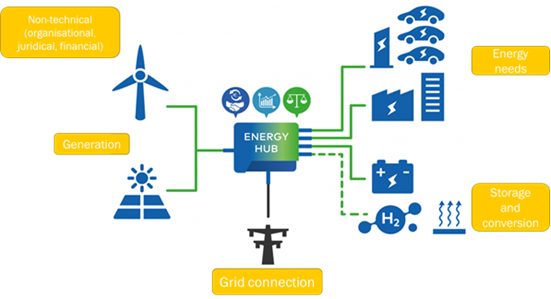
project information
Full title: | Energy hubs for the implementation of large-scale renewable energy |
Funding/Programme | MOOI SIGHUHE
|
Duration | 2022-2026 |
Partners | Alliander, Sunrock Development BV, Ventolines BV, Recoy BV, SemperPower BV, PARKnCHARGE Opco BV, Stichting ElaadNL, Over Morgen BV, Connectr – Energy innovation, TNO, Saxion, Shared Energy Platform Holding BV. And thanks to EGEN, who successfully helped us with the subsidy application |
project description
Increasing decentralized power production from wind and solar are putting a strain on the capacity electricity grid in different parts of the Netherlands. Consequently, new projects cannot be connected to the grid preventing growth of renewable energy production. Also, when power demand is exceeding the transport capacity, an extra alternative electricity flow is needed to fulfil the power demand. This could be solved by increasing capacity: grid expansion. However, this is expensive and takes years of time to be realized. Although grid expansion is inevitable in the long term, a solution is needed for a short/medium term. If the copper route is not an option anymore, then an alternative route through conversion to energy carrying molecules can be a solution. For this purpose we need major breakthroughs, advanced technologies and new integrated renewable energy systems for the energy hubs. Integrated networks of heat, gas and electricity systems with innovative energy conversion and storage technologies are required for the energy supply in our future cities, and without cooperation between very different stakeholders this transition will not be possible.
The goal of the EIGEN project is developing and testing a blueprint for the realization of Energy Hubs to promote the local integration of large-scale generated renewable energy. This blueprint can be applied to various business park archetypes and acts as a starting point for realizing the large-scale rollout of Energy Hubs. The project leads to concretely developed solutions (blueprint & EIGEN tools) that will be applied before 2030 and contributes to reducing CO₂ emissions in the Netherlands.
Our role in this project is to develop innovative strategies by developing models of subsystems of energy hubs by combining energy carriers such as electricity, heat, gas which these models can accurately simulate the dynamic behavior of system. Such models can either be used for the energy calculation tool, but also as validation base for less complex models within the energy management system (EMS) and explore if the models would fit to the current optimization algorithms for use in an EMS setting. The UT has developed a platform for smart grid model predictive control called DEMKIT. We work on digital twin modelling and application of DEMKIT.
The Energy Systems Integration research group within the Faculty of Engineering Technology and the Energy Group at the Faculty of Electrical Engineering, Mathematics, and Computer Science (EEMCS) are collaborating closely on the EIGEN project.

